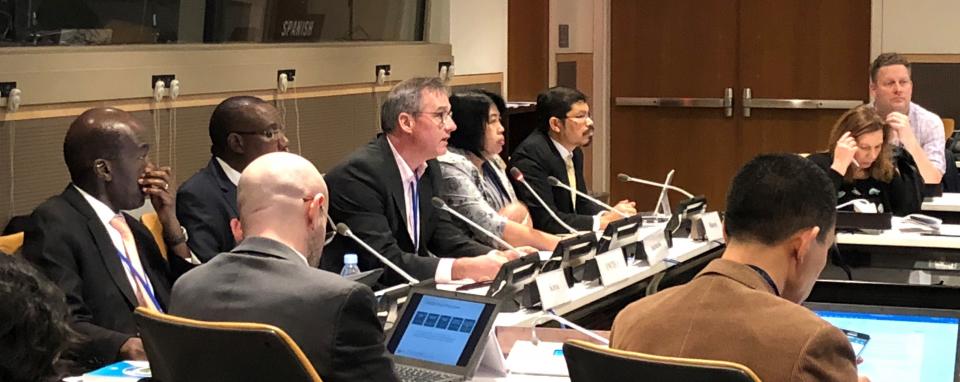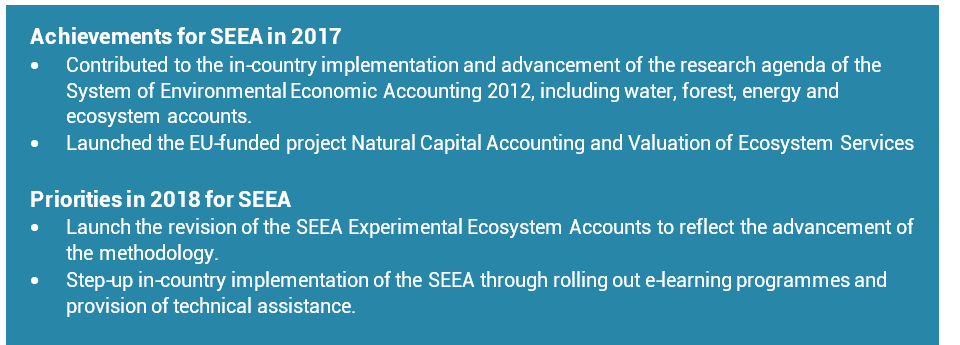SEEA at the 49th Session of the UN Statistical Commission

Close to 700 participants from 148 countries came together for the 49th session of the United Nations Statistical Commission (UNSC) from 6-9 March, 2018 at the United Nations Headquarters in New York. Held since 1947, the UNSC brings together Chief Statisticians from UN Member States and is the highest decision-making body for international statistical activities. This year, around 88 side events were organized and over 79 official or background documents considered on topics ranging from migration to climate change.
Two side events at the Statistical Commission focused on the SEEA brought together stakeholders from different countries and international organizations. In the first event, “Growing Uptake of the SEEA”, the Chair of the UN Committee of Experts on Environmental Economic Accounting (UNCEEA), Bert Kroese, started off the event with a brief review of the progress made in the UNCEEA work programme over the past year. This was followed by a panel session, with speakers from Indonesia, Kenya, Malaysia and Uganda sharing lessons learned during the implementation of SEEA accounts through the recent UN Development Account project. Panelists also discussed the way forward, including how international organizations such as UN Statistics Division (UNSD) can help. In the process of performing national assessments and plans for the SEEA, countries noted the importance of creating stakeholder arrangements and obtaining buy-in from line ministries and other stakeholders, which is especially important as the data needed for creating SEEA accounts is usually housed in various ministries.
Participants also noted that the SEEA can be implemented in all countries, regardless of how developed their statistical system is or how advanced their environment statistics are. Countries also discussed the importance communicating the results of the SEEA to different stakeholders, whether they are policy makers or the general public. Moving forward, the panelists agreed that international support remains key to expanding their SEEA programmes, whether it is through further training or providing consultants for technical backstopping.
A second side event, Sanitation Chain Monitoring for the SDGs: to Protect Public Health, Environment as well as to Address Inequalities in Access and Impacts, was co-convened by Statistics Netherlands, IBGE Brazil, Philippines Statistics Authority, Ugandan Bureau of Statistics, WHO and UNSD. Select countries provided updates on their efforts in monitoring wastewater and its safe treatment, as well as how they are linked to sanitation monitoring within the SDG framework. The meeting also highlighted methodological and data issues discussed at the recent Expert Group Meeting on Global Wastewater Monitoring for the SDGs held in Geneva in early March 2018, as well as recommendations for effective monitoring of wastewater for the SDGs based on the SEEA. The event highlighted water accounting issues that could be key to not only wastewater but could be effectively extended to other areas of SDG monitoring.

How international statistical standards such as the SEEA can support implementation of the 2030 UN Sustainable Development Agenda was one of the main themes throughout the Statistical Commission. One of the main challenges identified was how to support the implementation of the 2030 Agenda by building strong national statistical systems under the leadership of national statistical offices. Other challenges included integrating various information systems, such as official statistics, big data and geospatial information to create an information architecture that is ‘fit for purpose’. Improving communications with different stakeholders such as government, private sector, citizens, academia, media and civil society was also discussed. Last year also saw the launch of innovative e-learning courses in several areas, such as environmental-economic accounting, trade statistics and civil registration and vital statistics, to reach a wider audience.

The 49th session of the United Nations Statistical Commission concluded with discussion around the priorities for 2018, including the priorities for the SEEA. Continuing to support the implementation of the global indicator framework for the follow-up and review of the 2030 Agenda for Sustainable Development, including through servicing the Inter-Agency and Expert Group on SDG Indicators remains the top priority. There was further encouragement to continue innovating and improving tools for experts, policy makers and the general public to have open access to statistical data and methodological information.
